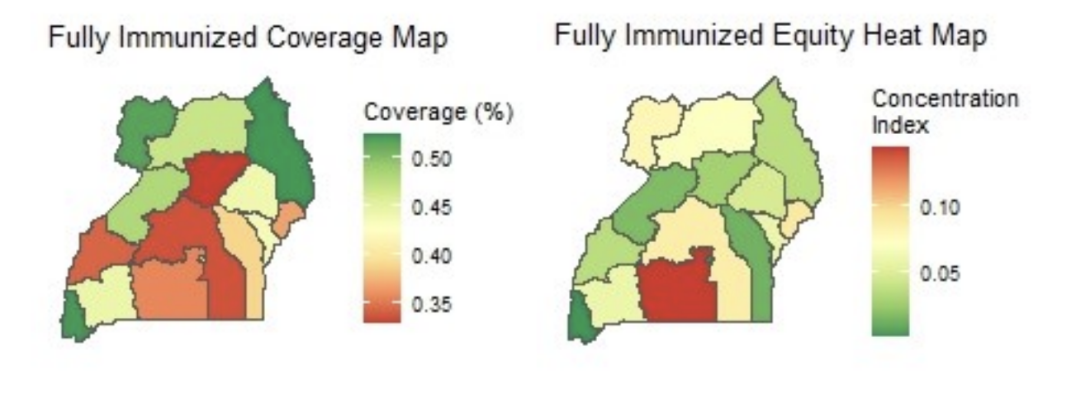
Financial, social, and geographic barriers to access as well as attitudes (e.g., vaccine hesitancy) limit vaccine uptake. These supply- and demand-side constraints derive from other inequalities such as shortcomings in the vaccine delivery, regional inequalities, socioeconomic status, gender, health insurance status, and literacy.
The Vaccine Economics Research for Sustainability and Equity (VERSE) Equity Toolkit provides a quantitative measure of immunization coverage and equity by (1) ranking the sample population with a composite direct unfairness index, and (2) generating efficiency (coverage) and equity metrics. Applied to standard DHS data or any dataset with individual observations and appropriate sociodemographic data, the model enables analysts to assess the equity and efficiency (coverage) tradeoffs in achieving the immunization program’s targets, including reaching vulnerable populations.
In VIEW-hub, the toolkit was applied it to all recent DHS (from 2010 to 2021) for 53 countries to estimate and compare the influence of the factors included in the composite ranking for several vaccines and vaccination statuses – the latter including being fully immunized with the vaccines scheduled for the child’s age and zero dose status. VIEW-hub presents the estimated coverage level for each vaccine and vaccination status, and three equity metrics: the Wagstaff and Erreyger concentration indices, and the absolute equity gap.
The toolkit was developed at Johns Hopkins Bloomberg School of Public Health and funded by the Bill & Melinda Gates Foundation. Several key stakeholders already use the toolkit for research and program evaluation, and are contributing to its development: Peking University, Makerere University, the International Centre for Diarrhoeal Disease Research, Bangladesh, Gondar University, and more.
- Watch the launch of the VERSE Equity Toolkit (May 25th, 2022)
- Read the VERSE Methods paper detailing the methods to estimate and decompose inequality in vaccine coverage.
Related Resources
-
VERSE Equity Reports
The Vaccine Economics Research for Sustainability and Equity (VERSE) project evaluated the status of vaccine coverage and equity status in the Democratic Republic of the Congo in 2013. Note: This resource is in French.
-
VERSE Equity Reports
The Vaccine Economics Research for Sustainability and Equity (VERSE) project evaluated the status of vaccine coverage and equity status in Rwanda in 2019.
-
VERSE Equity Reports
The Vaccine Economics Research for Sustainability and Equity (VERSE) project evaluated the status of vaccine coverage and equity status in South Africa in 2016.
-
VERSE Equity Reports
The Vaccine Economics Research for Sustainability and Equity (VERSE) project evaluated the status of vaccine coverage and equity status in Afghanistan in 2015.
-
VERSE Equity Reports
The Vaccine Economics Research for Sustainability and Equity (VERSE) project evaluated the status of vaccine coverage and equity status in Uganda in 2016.